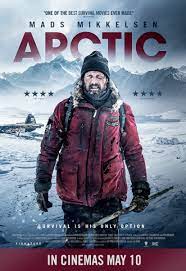
Arctic directed by Joe Penna (2018)
A young person suggested to me that Polar bears are the only animal that actively hunts humans. Not entirely correct, a polar bear often symbolises climate change and our own neglect to view our responsibility and connection to all animals on the planet. The planet strikes back through polar bears to question and challenge our sustainability on earth. I have questioned idioms and taken for granted assumptions mainly because I have overheard a person overuse idioms in all their attempts at speech in conversations. They exclude as well as assume universal connections and interpretations. They annoy me!
Another annoying statement is “Another day another dollar”. I responded is that life on earth for you? Mads Mikkelson’s performance in the film Arctic directed by Joe Penna (2018) was intense. The isolation and the vast white landscape – hostile (for me sitting in Australia) as well as invigorating like bringing children up in a minimalist white cube Where is the colour? and human connections to emotions, emotional expression and stimulation. This film offered me strength and responsibility beyond the dollar-focussed everyday. Survival and rescue for two people is the focal point. Capital gain and interest-based banking refused through the harshness of the environment and the knowledge that even though surrounded by many powerful countries his rescue was limited by vision, knowledge that he was there, as well politics. Which country would you turn to for rescue in the region? Of course, I was unfamiliar and checked a map and I assumed in the end that a Scandinavian country like Norway or Greenland were to be the life line and hope. I am uncertain and this uncertainty intrigued me.
With so much light the darkness of this film is intensified by minimal contact and the struggle. The silence, the will to survive and the frozen-communication was difficult and I – with the thoughts of survival tv series (Denmark) – knew I admired this in the character because it’s tough and culturally I am distant from nature survival techniques and skills. Surviving ice is a way of life for some and once the polar bear appeared I thought superficial. Until I was reminded that polar bears attack, are fierce hunters and won’t simply walk away like in an animation. The bear’s territory as well as survival seeking food for itself and a family is tough and made tougher through the impact of my (and others all over the world) lifestyle choices. I live connected to the Arctic and polar bears without a felt connection to them.
Mikkelson’s character doesn’t experience general everyday taken for granted connections with others – chatting, touching and relaxing. His plane has crashed and then, after crying out for help to another helicopter – theirs crashes too. His character’s sense of responsibility defies most of the people I come across in my everyday travels. His determination to rescue a woman because she has a young family – photo evidence – is superhuman. His strength – a contemporary viking.
In Norse mythology Magni is the God of strength and valour and Eir is the goddess of healing and predicting the future. Mikkelson’s strength and will to heal this woman he couldn’t communicate with and who needed medical attention, is foreign to me. The man, not a god, needed to survive and couldn’t predict this. Without magic he was left to his own knowledge of the environment, map following, and strength as well as nutritional understanding. I wouldn’t know to use my flare to save myself from a polar bear. Was this a representation of human flight-fight mode where stories have been told of superhuman strength during extreme survival and attack situations?
Eir, a female goddess, is associated with medical skill. In some stories Magni has fathered many children and others, the suggestion is that his strength is through solitude, loyalty and bravery. Mikkelson’s character has loyalty and bravery intertwined with his fierce responsibility towards the female in his care. Not a Hollywood blockbuster who would have had the female woken and intimate relations begun, Penna directed a film without direction towards an audience needing screen-mediated sex, intimacy and romance. The whiteness blanketed this as well as revealed that men can trudge towards survival – without knowing – without the complexities of romance or sex-interest fogging his needs for rescue.
© Cate Andrews, 2024.
You must be logged in to post a comment.